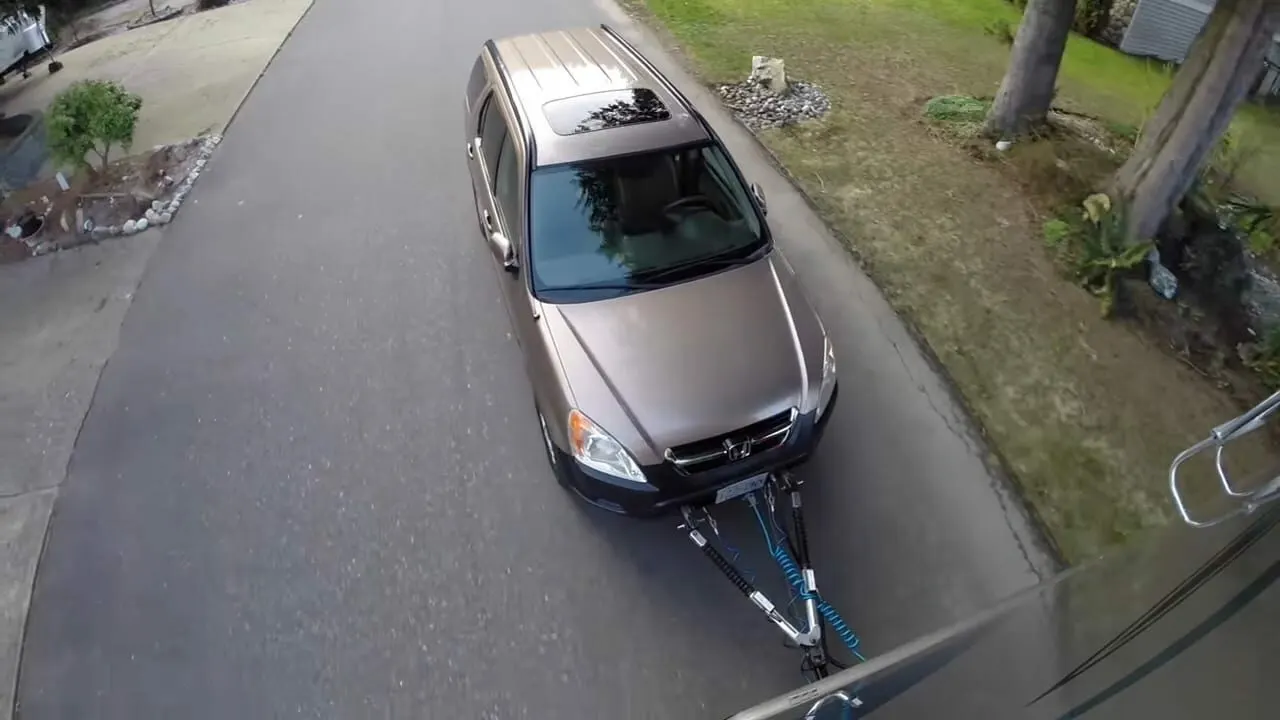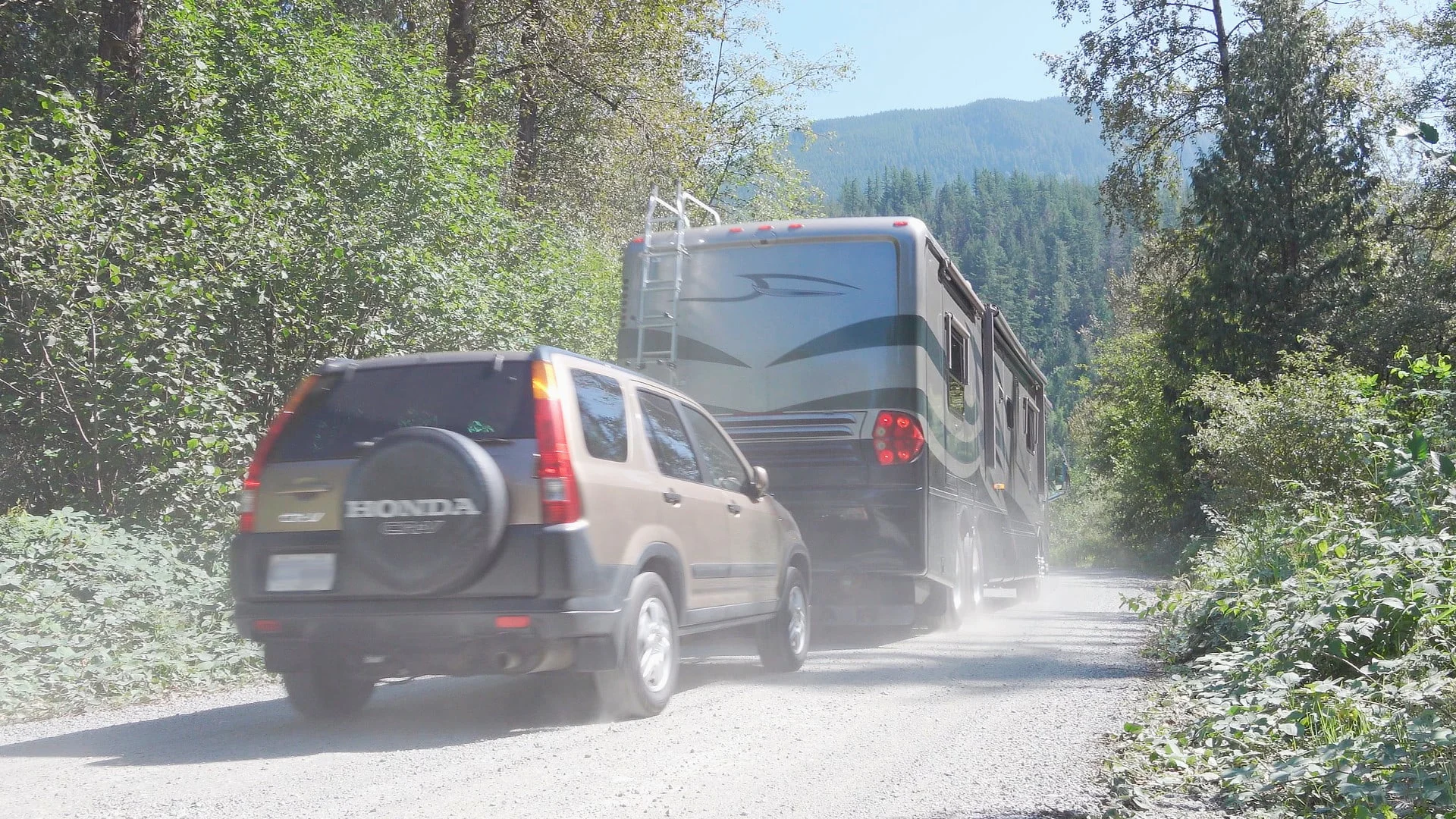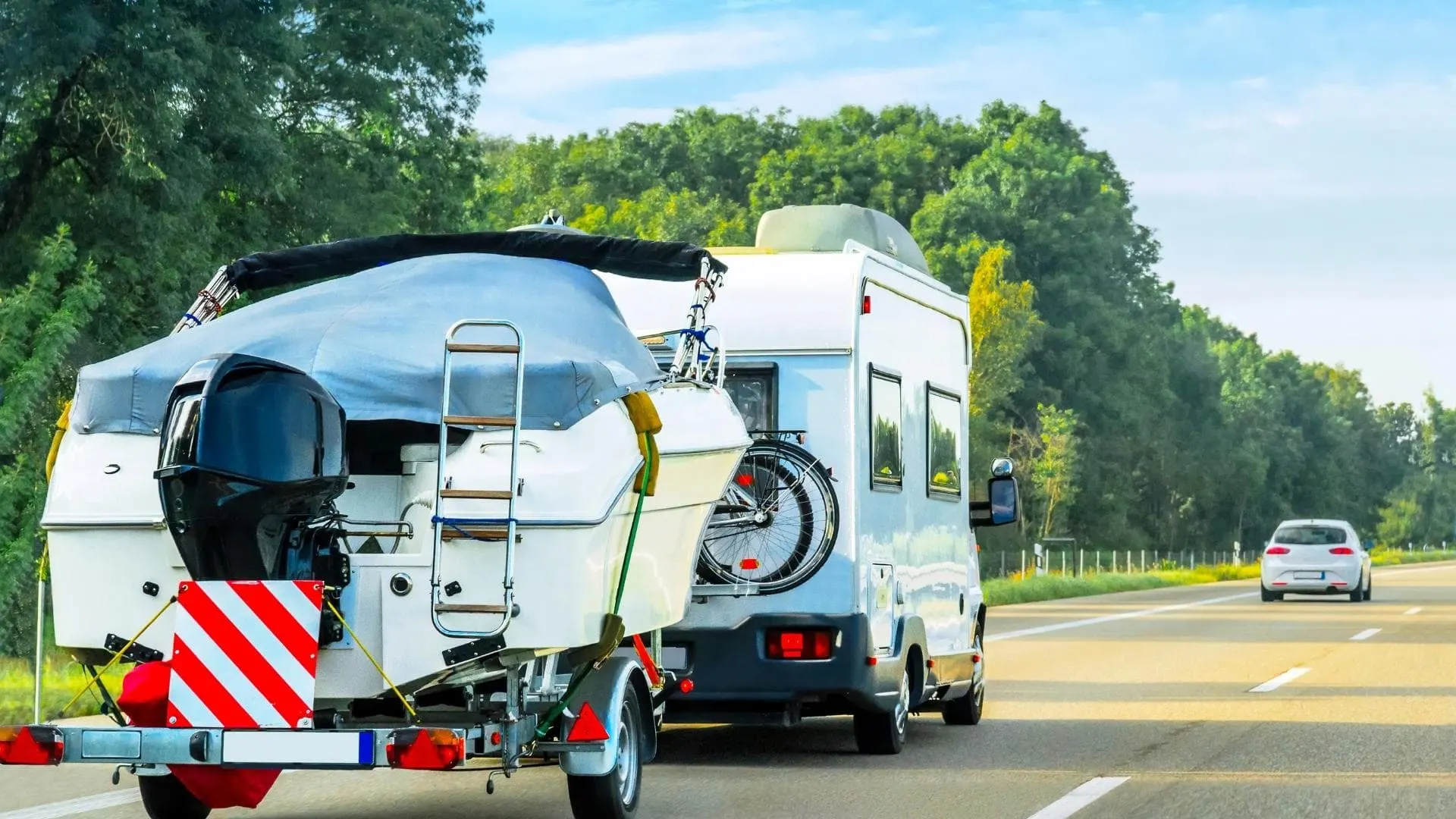Any RVer who tows a smaller satellite vehicle behind them (affectionately referred to as a “Toad” in RV parlance) should be familiar with towed car brake systems. For one thing, they’re required by law in most states/provinces in North America. Why were these laws established? For your safety and the safety of those with whom you share the road.
In addition to reducing stopping distance and keeping you and those around you safe, towed vehicle braking systems prevent unnecessary strain on your primary RV brakes.
Let’s take a look at towed car brake systems to see exactly how they work and why they’re so important.
- 1) What Is a Towed Car Brake System?
- 2) Why Is a Towed Car Brake System Important?
- 3) What Are the Three Types of Towed Car Brake Systems?
- 4) Are Towed Car Braking Systems Permanently Installed?
- 5) What Are the Legal Requirements for Auxiliary Braking Systems?
- 6) What Towed Car Brake System Do The RVgeeks Use and Why?
What Is a Towed Car Brake System?
A towed car brake system (sometimes referred to as a “towed car auxiliary braking system) exists to provide active brakes in the vehicle you’re towing behind your motorhome. It helps to manage the car’s weight and has the critically important job of bringing it to a stop in the event of a breakaway.
Regardless of local laws/regulations, we think that anyone who tows a vehicle behind their motorhome needs a supplemental braking system for that vehicle.
Why Is a Towed Car Brake System Important?
A towed car brake system is critically important for several reasons. Foremost is the matter of your safety and that of others on the road with you.
Safety
An auxiliary braking system can help to reduce stopping distance, or at least prevent the towed car from increasing your RV’s stopping distance. When attached, your towed car is adding its weight to the weight of your RV. So if you were to tow without a supplemental braking system, your stopping distance could increase substantially.

Towing without a supplemental braking system means your stopping distance could increase substantially.
Additionally, with a breakaway trigger, the system can help to keep the towed car under control in the event of a tow bar failure. And in the unlikely event of a complete breakaway, it can keep the car from ricocheting on its own down the highway.
You can see why a towed car brake system is critically important from a safety perspective.
Required By Law in Most Places
In most U.S. states and Canadian provinces/territories, a supplemental braking system is required by law whenever you’re towing. In all but 10 states, you MUST have a towed car braking system installed whenever you tow a trailer of a certain weight or any vehicle.
Reduces Strain on Brakes
And finally, a towed car brake system helps to reduce the strain on your RV’s primary brakes. Your motorhome will not only brake more easily but the wear and tear on those brakes will be reduced considerably by your supplemental braking system.
What Are the Three Types of Towed Car Brake Systems?
There are three different varieties of auxiliary braking systems. Let’s take a brief look at each.
Progressive
A progressive system receives a signal when the motorhome’s brakes are engaged, and responds to that signal by slowly and continuously applying the supplemental brakes with increasing pressure. The longer the RV’s brakes are engaged, the more pressure the towed car braking system applies (up to a maximum setpoint).
So, the amount of pressure applied to the tow vehicle’s brakes increases progressively (to a point) whenever the RV’s brakes are engaged.

Our towed car braking system is a progressive system. As we continue braking, so does our Invisibrake system. The longer we apply our motorhome’s brakes, the harder our Honda CR-V will brake, though it never skids our tires.
The problem with this type of supplemental braking system is that the tow vehicle may end up braking harder than the RV because no matter how little pressure is being applied to the RV’s brakes, the progressive braking of the tow vehicle occurs. So, it’s possible that you could apply light braking to your RV (for instance, while in slow-moving traffic), and your tow vehicle could end up having greater/full braking applied.
Proportional
Proportional towed car brake systems work in tandem with your motorhome’s braking system. Generally, proportional systems operate with a sensor or accelerometer that monitors your primary brakes, sensing the rate at which your motorhome is slowing down when the brakes are applied. The towed car brake system responds by applying a proportional amount of pressure, slowing your towed car at the same rate.
Most proportional supplemental braking systems (i.e. those that don’t supply power/vacuum to the towed car’s braking system) generally don’t work well with vehicles that have power assist brakes. There are exceptions (the Blue Ox Patriot 3 being one), but in general, proportional systems are not the best choice for vehicles with power assist brakes (like many hybrids, for example).
Direct
Direct towed car brake systems offer the most accuracy of all three types of supplemental car braking systems. A direct braking system is directly wired to the brakes of your motorhome, so it precisely matches what your motorhome brakes are doing. It’s not progressive OR proportional. It directly duplicates the force and speed of application of your primary braking system (in your RV) to your towed vehicle’s brakes.
This type of system generally prevents under-braking and over-braking by directly sensing the extent of braking being applied to your RV. The brakes of your dinghy vehicle will only be applied when the brakes of your motorhome are applied.
In addition to it being the most precise system available, the advantage of a direct towed car brake system is that once it’s installed, there is no additional work to do and rarely are there any adjustments to be made.
But, the downside is that this is the most expensive type of system and, due to the difficulty of installing and calibrating it correctly, it really should be professionally installed.
Note: For vehicles with continuous power-assist brakes (hybrids, for instance), a brake pressure reducer (a type of adapter) is required.

In most states, trailers with a total gross weight of over 3000 lb need to be equipped with an independent braking system, though most experts recommend that they be installed on trailers weighing 1500 lb or more.
Are Towed Car Braking Systems Permanently Installed?
A toad brake system doesn’t necessarily have to be permanently installed in a specific car. Towed car braking systems can either be permanently installed or portable. Portable systems allow them to be more easily moved between towed vehicles, which can be especially desirable if you want to be able to tow more than one vehicle at different times.
Portable
A portable towed car braking system can be easily transferred from one tow vehicle to another, is less expensive than a permanent system, and doesn’t need to be professionally installed. Typically, these systems sit on the floor in front of the driver’s seat, using an actuator arm to activate the towed car’s brake pedal when triggered.
While avoiding the extra expense of a permanent installation, you do have to place & configure the portable system (correctly) each time you tow your car. Plus, you have to remove & store it when it isn’t being used.
Permanent / Non-Portable
A non-portable, or permanent, tow car brake system is hard-wired to the tow vehicle and often to the motorhome as well.
If you tow regularly (as we do), there’s no question that a permanent system (like our Roadmaster Invisibrake system) is preferable. With a permanent system, we don’t have to install and remove it over and over again, nor do we have to store the system.
The disadvantages include the fact that the system is more expensive, particularly because it’s best to have it professionally installed. You also may not be able to transfer it to a new vehicle if you get another toad, and you can’t easily transfer it from one vehicle to another.
What Are the Legal Requirements for Auxiliary Braking Systems?
The legal requirements for auxiliary braking systems vary. We suggest using this site to check the requirements for your home state/province and where you’ll be traveling.
https://www.brakebuddy.com/towing-laws.html
What Towed Car Brake System Do The RVgeeks Use and Why?
As you may know from our post on towing a car behind an RV, we flat tow our car (a 2003 Honda CR-V) behind our motorhome (4 wheels down). (For more on what cars can be flat towed behind an RV, check out that post.)
We have an entire post on our RV towed car braking system – the Roadmaster Invisibrake Auxiliary Tow Brake System – and its installation.
Roadmaster installed the InvisiBrake system on our 2003 Honda CR-V at their factory in Vancouver, WA.
For complete details about our system and its installation, see our post linked above and have a look at our corresponding video:
Geek Out With Us Every Week
Join our newsletter to learn about all things RV-related. Every week we offer free tips, tricks, product reviews, and more to our online community of RVers. So, whether this is your first time on the road or you’re a seasoned expert, we’d love for you to geek out with us!


RichardM
Wednesday 10th of April 2024
Another fan of the NSA system. Purely mechanical, easy to keep adjusted, uses no power from the towed vehicle, and nothing to set up when towing. About as simple as you can get. It just works…
Mike
Saturday 26th of August 2023
I am new to flat towing however after doing a bunch of research I settled on the Rvi3 portable brake system. Here are some of my reasons: 1) proportional based on g sensor 2) ease of setup (after installation it only takes 3 minutes or less to setup before driving) 3) came with a communication hub that supports a tablet to monitor braking. 4) easy to add tpms that shows on same tablet 5) toad charge system added also monitored on same tablet 6) hub also can be used as input to level my rv 7) tablet has alarms for all the systems being monitored
Sandi
Sunday 9th of April 2023
We purchased a Brake Buddy Classic B in 2017 when we hit the road full time in 2017.Last year it started to loose vacuum and wouldn't maintain pressure. We also broke the plug,had spliced the cord and lost a button. When we called, our options were to ship it back or bring it to Emporia, KS which we decided to do. We were greeted with professionalism plus friendliness. Within an hour and a half of dropping it off, we received a call it was repaired and all at NO CHARGE! Wouldn't even take a tip and everything was replaced! We feel a company that stands behind their product with pride and fantastic customer service deserves to be mentioned. Side note: Emporia is a great little town to visit, most notably the Zoo and Veterans Memorial Park.
TheRVgeeks
Sunday 9th of April 2023
So good to hear, Sandi! Glad that Brake Buddy took care of you when you had problems. We consider that to be the true tell of a quality company. ANYONE can be a good company when everything goes right. But when they step up and do the right thing when something goes wrong (i.e. when you NEED them to be there for you), it's nice to know which companies you can count on.
Kitesquid
Sunday 9th of April 2023
You didn't mention surge brakes.
I have a Hercules RV Tow Bar manufactured by NSA RV Products, Inc.
It has an integrated surge brake, and the purchase price includes yoyr choice uf base plate.
When I priced out the entire towing system and the ease of use the NSA system was the clear winner compared to all other systems on the market.
Nick Mitsinicos
Sunday 27th of November 2022
I first started towing a car in 1998 with the Classic Brake Buddy and continued using it until 2 years ago when it failed and needed immediate replacement to continue our trip. I bought the Classic II at Camping World and installed it myself. It is a digital system that relies upon its electric motor to spin-up to apply the brake. It does not respond fast enough nor does assist normal braking the way the original air pressure unit did. I have to stand on the brake and pray that I don't have an accident. I, too, tow my Honda CRV. 50,000 miles of its 218,000 miles are towed.
Two weeks ago, on the Hopkins website, I learned that they have reverted back to the air pressure solution with their Class II. I suspect that they had to. Apparently they only learned about kinetic energy and conservation of momentum recently. I asked them to swap my electric Class II unit for the new air-pressure unit but they have not responded.
Where can I learn more about this issue and what do you recommend as an alternative solution?
TheRVgeeks
Saturday 3rd of December 2022
Thanks for sharing your experience, Nick. We have two preferred choices in braking systems, which are both built-in, which we prefer for their ease of use (nothing to put in place or remove each time we tow, which is very handy for us full-timers). The first is the one we use - Roadmaster's Invisibrake, which we absolutely love: https://www.roadmasterinc.com/products/braking/invisibrake/index.php The other model we've heard excellent reports about is the SMI Air Force One, but if we recall correctly, that can only be used with RVs with air brakes.